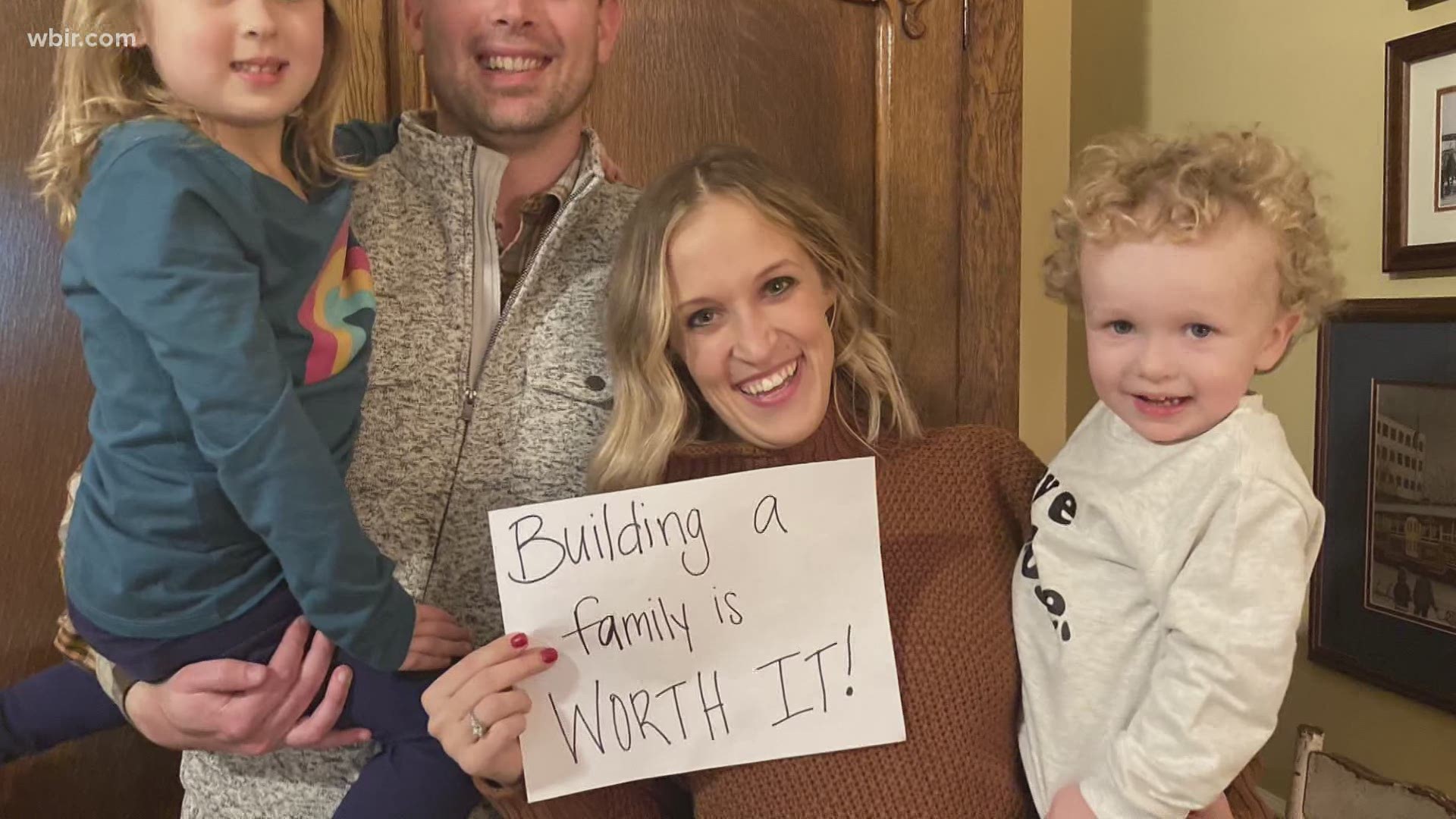One in Six: Couples open up about the true cost of infertility in Tennessee
For families struggling with infertility, the state's lack of mandated fertility coverage worsens an already brutal journey.
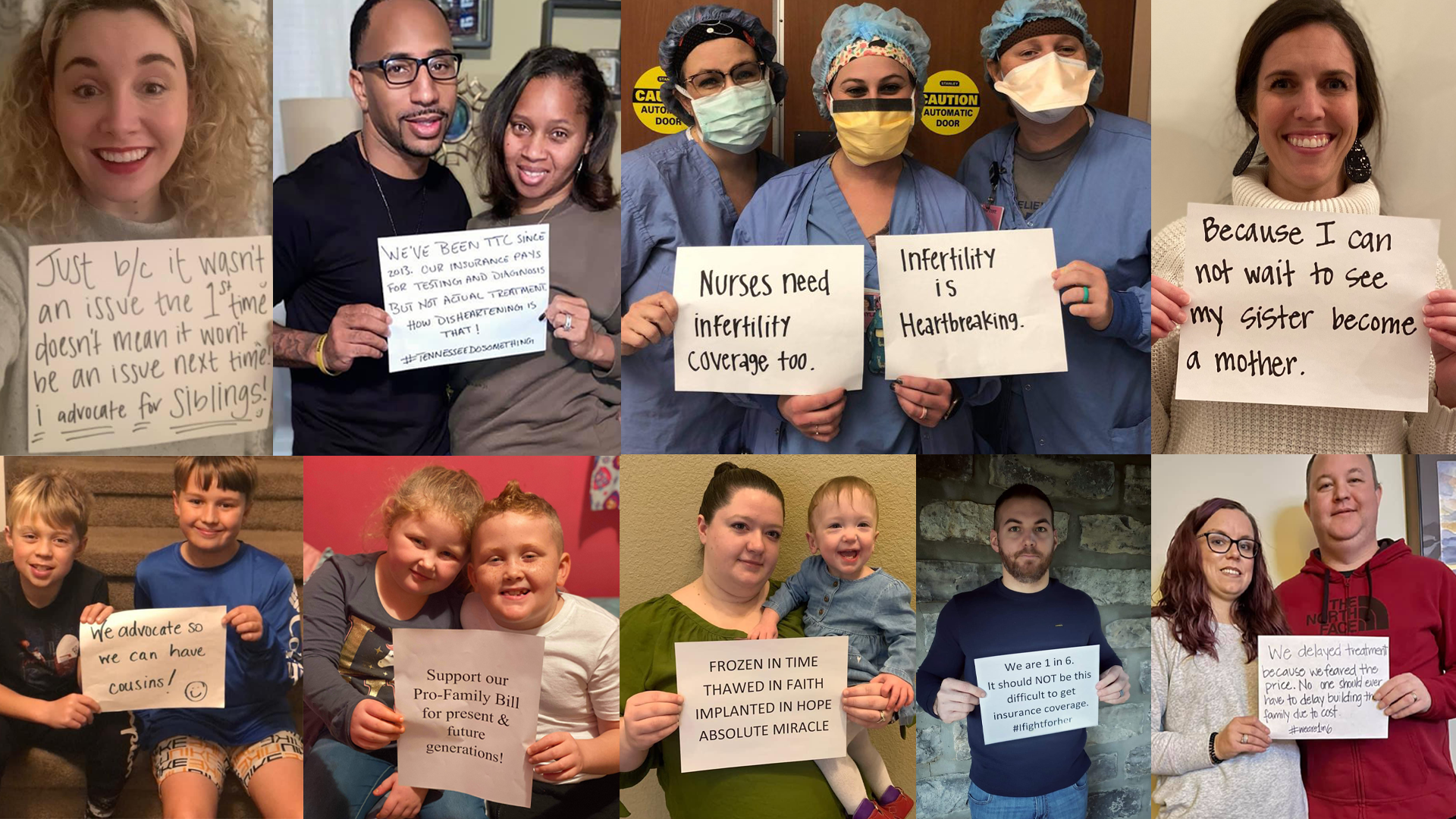
One in six. That's the number of couples who will struggle with infertility in the U.S.
It's a number that can be hard to put into perspective, especially when couples face shame and sadness throughout their infertility journey.
Many families are left to navigate a labyrinth of steep emotional, physical, and financial pains in silence.
In Tennessee, this journey is exacerbated by a lack of mandated fertility coverage.
"One in Six" is a series which shines a light on the question many couples are asking themselves in private:
What would we pay, or give up, to have a child?
The Price for a Family
Kirsten Gonzalez and her husband, Marc, thought they had time.
"When we were first getting married and starting out our marriage, I was nervous because I was trying to finish my Ph.D. and trying to start my career. We weren't trying at the time and didn't realize it would be so hard, didn't know the struggles that we would face," Gonzalez said.
Both hardworking professionals with advanced degrees, Kirsten remembers falling in love with Marc under the fluorescent glow of a summertime restaurant gig in their hometown of Olney, Maryland back in 2007.
When her doctorate degree paved the way for a chance to become an Assistant Professor of Psychology at The University of Tennessee, everything was just so as they made the move from Maryland to Knoxville.
The steady careers and loving marriage were all in hand. So were the signing papers for a two-story house with brick walls and light green window panes.
Their first home in a new community.
A baby, they hoped, would be next.
"I always thought, like, I'm going to be a great mother. I have a great relationship with my mother. I always thought [motherhood] would be something that would come to me so easily. But it just hasn't been easy for us." Gonzalez said.

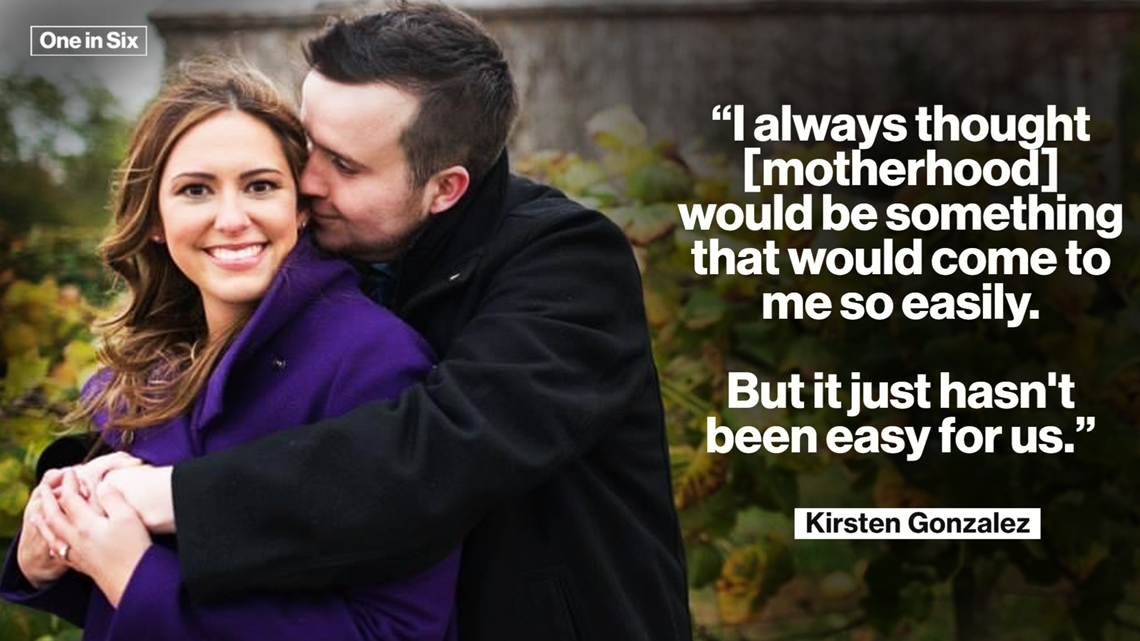
Almost a year into trying though, the nagging feeling Gonzalez had that something was wrong turned out to be right.
Surgery would reveal she had blocked fallopian tubes and a uterine septum. Then, she suffered a miscarriage.
"That was really devastating. I also feel like it’s hard to talk about. We don’t talk about miscarriages or infertility struggles a lot, and so I felt really alone. Marc and I were really sad, but were also like well if it can happen once well maybe we’ll get pregnant again really quickly and that didn’t happen," Gonzalez said.
At this point, their journey to try and have a baby has taken three-and-a half years. So they turned to in-vitro fertilization - an expensive option only an estimated 3% of couples struggling with fertility go through.
The price tag is a steep one; cost estimates range between 20 and 25 thousand dollars. That's just for one round - some couples require two or three rounds of IVF to get pregnant.
"We really want a baby and that’s really what matters. And we’re running out of time," Gonzalez said.
Kirsten and Marc knew they did not want to take out a loan to try and have a child. Over 52% of IVF patients between the ages of 25 and 34, incur over $10K in debt; 26% incur over $30K in debt.
The couple took a hard look at their assets.
Did they own anything of value that could give them a financial boost for this process?
Their eyes landed on the home they hoped to one day fill with children.
It would have to go.
Many Options, No Support
The decision Kirsten Gonzalez and her husband made to sell their home in order to pay for IVF treatments represents the lengths Tennesseans struggling with infertility are willing to go through.
Nationwide, one in six couples will experience infertility.
Broken down further on a state level, about 32% of Tennesseans are of reproductive age. Of that group, an estimated 17% will face infertility and will require treatment in order to build a family.
This is a disease that does not discriminate by gender - officials estimate a third of fertility challenges are due to male factors, a third to female factors, and a third are due to unknown causes.
Despite the amount of people struggling through infertility, there is no mandated fertility health coverage in Tennessee.
Couples must go through treatment with little to no financial support throughout the process, sometimes paying thousands of dollars out-of-pocket for treatments.
The cost of treatment varies depending on which type you receive.
Median per-person costs can range from $1,182 for medications only, to $24,373 and $38,015 for assistive reproductive technology procedures like IVF, according to one study.
In a state where the average median household income is roughly $9,641 lower than the national average, any price can be devastating for couples trying to conceive.

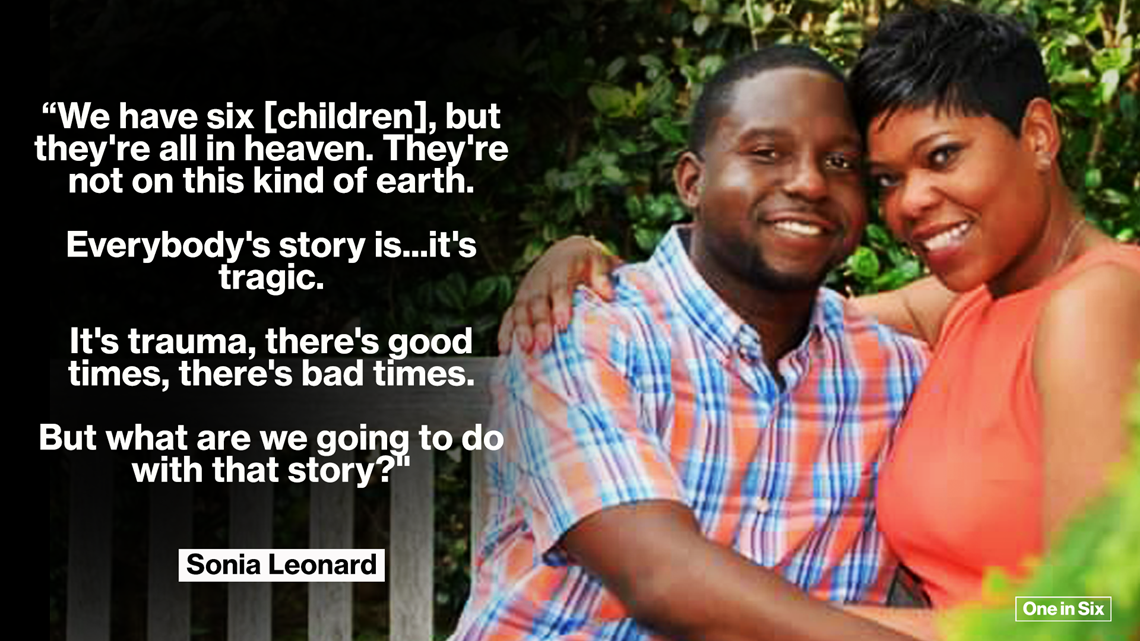
Sonia Leonard and her husband, Willie, have suffered through five miscarriages and lost six babies throughout their journey.
Last year, Leonard required an emergency blood transfusion and surgery after doctors discovered her left fallopian tube had ruptured due to an ectopic pregnancy.
She lost 1.5 liters of blood and very nearly died.
IVF, the most expensive infertility treatment, would be the only option if they wanted to have children.
"In my mind, even before knowing a price tag, I just knew...IVF is going to be expensive. Only the celebrities are able to afford IVF or you got a mortgage, your home, or you got to pull out loans," she said.
According to Tennessee Fertility Advocates, 19 states have mandated fertility health coverage, 13 of which include IVF.

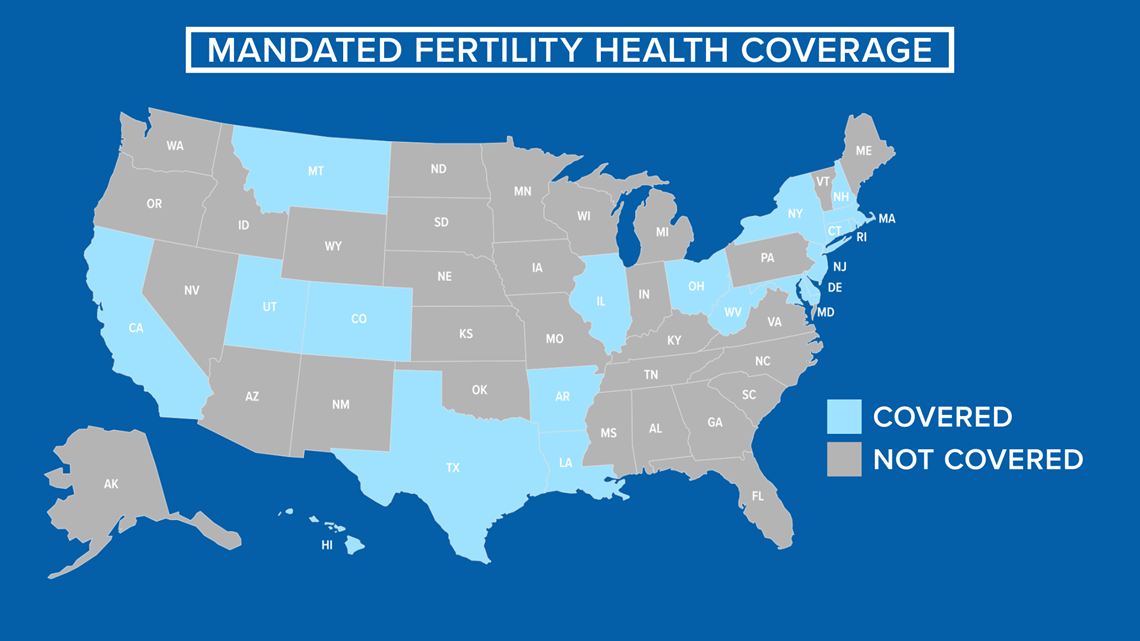
If Kirsten and Marc had not moved to Tennessee from Maryland, the IVF treatments they sold their first home for would have been covered.
“It's ironic that we left a state that has mandated coverage for IVF, and we move to a state that doesn't," Gonzalez said.
Some couples find other options out of state. In Tennessee, Victoria Jones faced a variety of barriers trying to get IVF before traveling to a clinic in Syracuse, New York for IVF treatment.
She is now a hesitant five weeks pregnant.
"As of right now, it was totally worth it and still half the cost. But it stinks that we have to drive 1,200 miles, 17 hour drive each way," she said.
The lack of mandated coverage also packs a hefty dose of financial anxiety onto families, exacerbating the pain of a journey already seeped in it.
Anna Beth Walker is a resident of Claiborne County and suffered two miscarriages, one in 2018 and another in 2020.
After three rounds of failed IUI, Walker is currently going through the IVF process.
"The biggest part of me was like, how are we going to afford this? I mean, this is huge," she said.

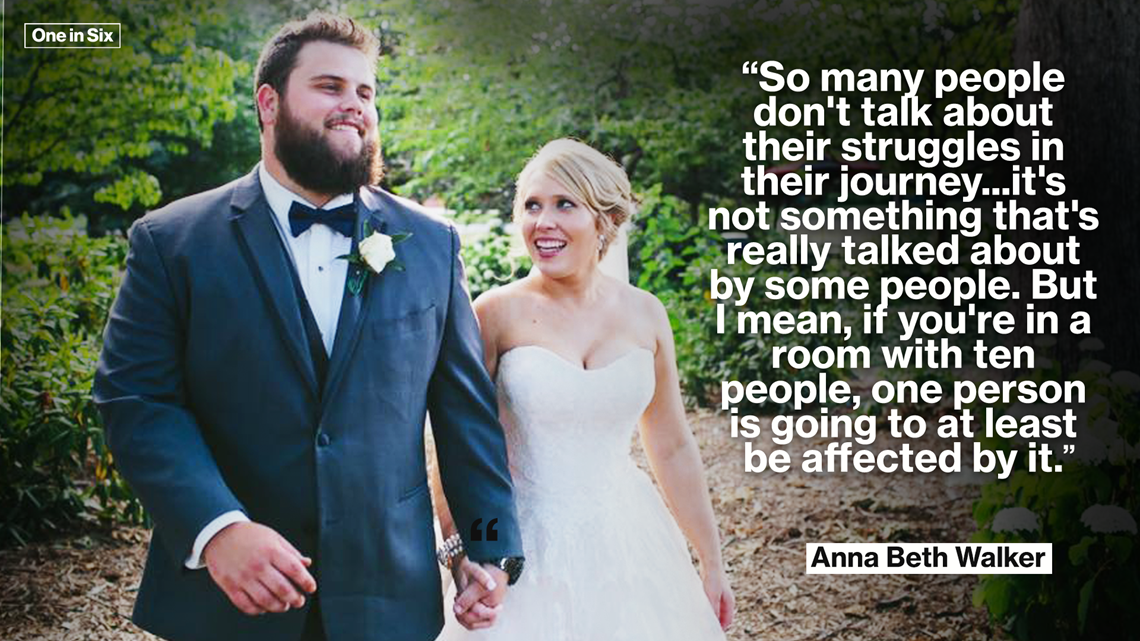
Walker works for the county. Her husband, Jacob, is a teacher and part-time football coach for Claiborne County High School. Even though he works 70 hours a week between those two jobs, Jacob still considered taking on an extra job at Starbucks to help pay for treatment.
The company is known for good fertility insurance, offering $25,000 for IVF coverage, and $10,000 for the necessary medication. But the closest "standalone" Starbucks nearest the Walkers is an hour away, so that was no longer an option.
Walker sought benefits from her employer, an experience she said can cause feelings of awkwardness in the workplace.
READ: "Makes sense of my pain": 10News anchor Beth Haynes shares her infertility journey
"Since coverage is not really widely available across the state by employers, it can be even more isolating because you're like, 'Ok well, I'm about to tell them I have this huge problem," Walker said.
Families who already have children but are still going through an infertility journey are not spared from financial stress.
Cassie deVente and her husband, Levi, are raising a two-year old son named Norris. Though the love their son brings them helps temper the anxiety of a second infertility journey, they still would like to grow their family.
The high cost of doing that is almost impossible to not worry about.
"There's a lot of anxiety, absolutely. There is this fear of like, well what if it doesn't work? And we've put all of this into it and it doesn't work? That's really scary," deVente said.

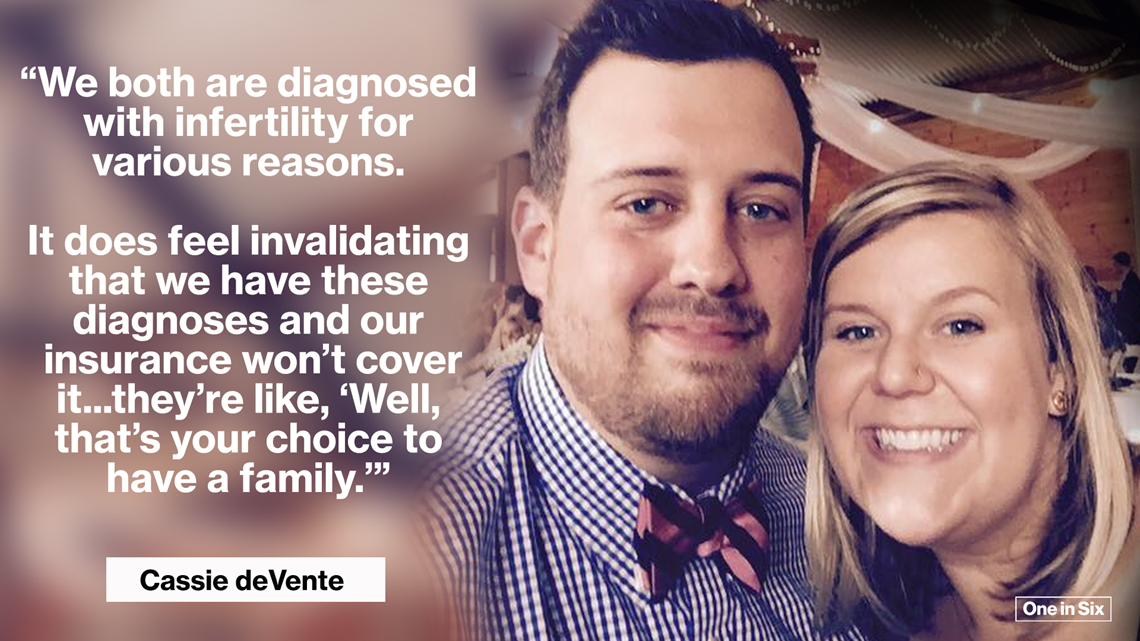
Maryville resident Melody Harrah is the East Tennessee leader for Tennessee Fertility Advocates, a grassroots advocacy group intent on finding a lawmaker willing to sponsor a bill which mandates infertility coverage in Tennessee.
In her experience, the shock of what infertility treatments really cost is one of the first awful realizations couples face.
"We didn't ask for infertility, we didn't want to be part of this club, we were kind of handed this and you just deal with it," Harrah said. "And so when insurance companies just flat out not doing it...it's one of those where you're like, 'Well, tell me why, like, do you not love babies?' Because that's what I want. Do you not want people to have a family? Are you against that?"

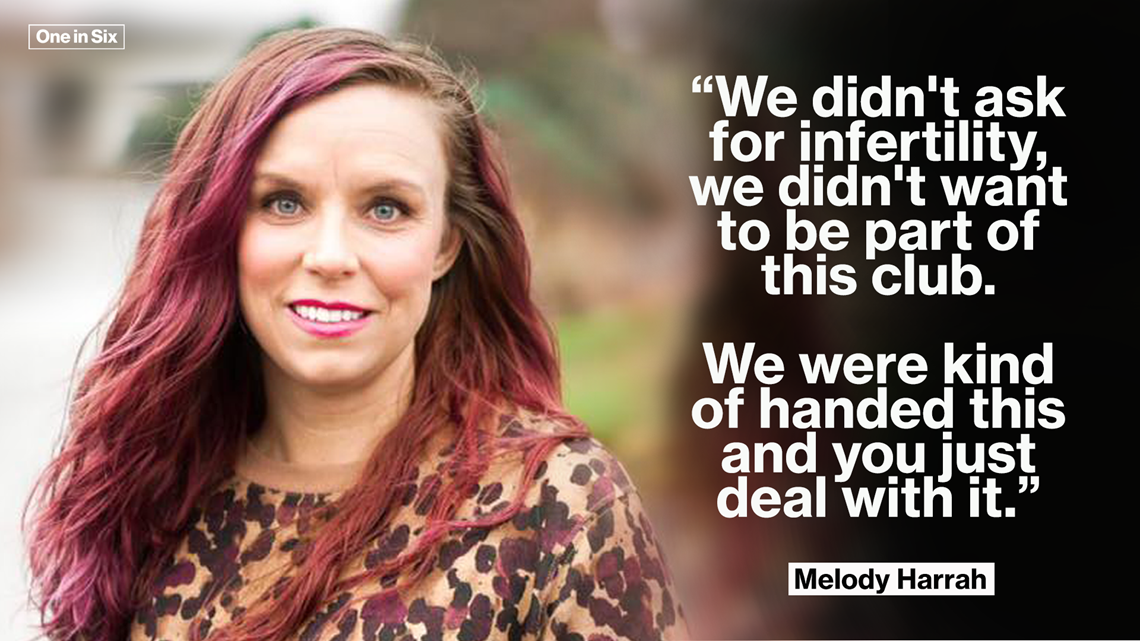
Across the state, it is this "club" of women and men in varying stages of their infertility journey who are hoping to push a Pro-Family Fertility Care Bill through the legislature.
Mollie Walker of Collierville and her friend Lauren Brown co-founded Tennessee Fertility Advocates. Both struggled with infertility and spent thousands of dollars to get pregnant and start building a family.
Their organization has drafted legislation that covers fertility diagnosis, fertility treatments including medication and fertility preservation.
Tennessee Fertility Advocates said that they believe infertility, a medical condition, should be treated like other diseases.
“It shouldn’t be treated anything else other than the disease that it is. How come the reproductive system is the only one that isn’t covered by insurance?” Walker said.
TN Senate Member Becky Duncan Massey (TN-R), represents Knox County and said she is willing to sponsor this proposed legislation after seeing the effect on families.
"I just don’t think people really grasp what these individuals go through that are experiencing infertility - the pain and how much it affects many Tennesseans," she said.
Senator Massey is meeting with representatives from insurance companies and chair of the Senate Commerce Committee this week.
Senator Bo Watson from Chattanooga is co-sponsoring the legislation with her.
The bill is in the very early stages of it's life. It's been written, but still has to be presented to committee, debated then voted on.
In the meantime, Tennessee Fertility Advocates will keep fighting and building a community of families who need support, not all of which is financial.
Finding Community
Every Wednesday at 8 p.m., a group of people pings in from across the state for a weekly Zoom meeting hosted by Tennessee Fertility Advocates.
They call themselves the Wednesday Warriors.
It's an online space where guest speakers are invited to touch on a host of subjects related to infertility, from new technologies to correct ways to share their story with lawmakers.
People in the group can also connect or share resources.
Christine Richmond discovered the group shortly into her infertility journey and said the ability to connect with other couples going through the same thing makes her feel less alone.
"You get to talk to people that went through it, are going through it or is about to go through it. Or dream of going through it, you know, so it's like a little community," Richmond said.


This is a group that has seen miscarriages and heartache, loss and joy over the years.
Sonia Leonard led a prayer for the group some weeks ago and also said, financial support aside, the group has been helpful emotionally.
"Just like cancer does not discriminate, just like any of these other diseases, they don't discriminate. Seeing so many faces, different faces, to be able to come together and to care, genuinely care for one another, to show empathy and compassion, that in itself is rewarding," Leonard said.
At the helm of many Wednesday Warrior Zoom meetings is Kara Edwards, the director of the non-profit Starfish Infertility Foundation and Nashville Grassroots Advocate Lead for Tennessee Fertility Advocates.
She estimates her own family has spent over $100,000 in infertility treatments to try and conceive. It was only after a last-chance trip to see the top infertility specialist in the country, at CCRM in Denver, that she was able to get pregnant with twins.
Though she says every surgery and shot was worth it to have her twins, the journey is not one she wishes on anyone.

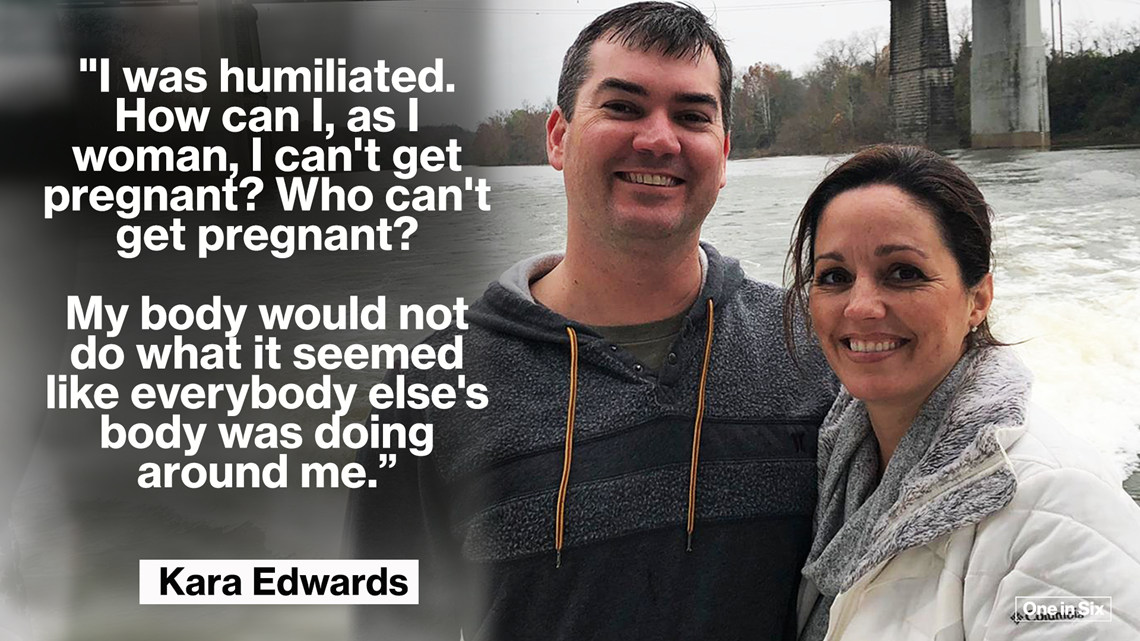
"People say, why don't you talk about it? I was humiliated. How can I, as I woman, I can't get pregnant? Who can't get pregnant? My body would not do what it seemed like everybody else's body was doing around me," Edwards said.
A hallmark study of 200 couples conducted by Harvard in 2009 found that half of the women and 15% of the men said infertility was the most upsetting experience of their lives.
It is a darkness Sonia Leonard also understood after suffering back-to-back miscarriages in 2020.
"I was broken. Like completely and utterly broken, where I went into a depressed state. I could not even see anything. It was just dark all around me," Leonard said.
The constant question of when or if your journey will be over with the next treatment is a specific type of anxiety many find hard to bear.
Infertility takes away the highest highs other people get to experience during pregnancy.
People going through infertility learn, Victoria Jones said, to guard their heart.
"When are you happy?" Victoria Jones said. "Is it when you get the positive on the pregnancy test, finally? Is it when you hear a heartbeat? It's almost like you're scared to be excited because you just don't know if it's going to keep going...if it's going to stay," Jones said.

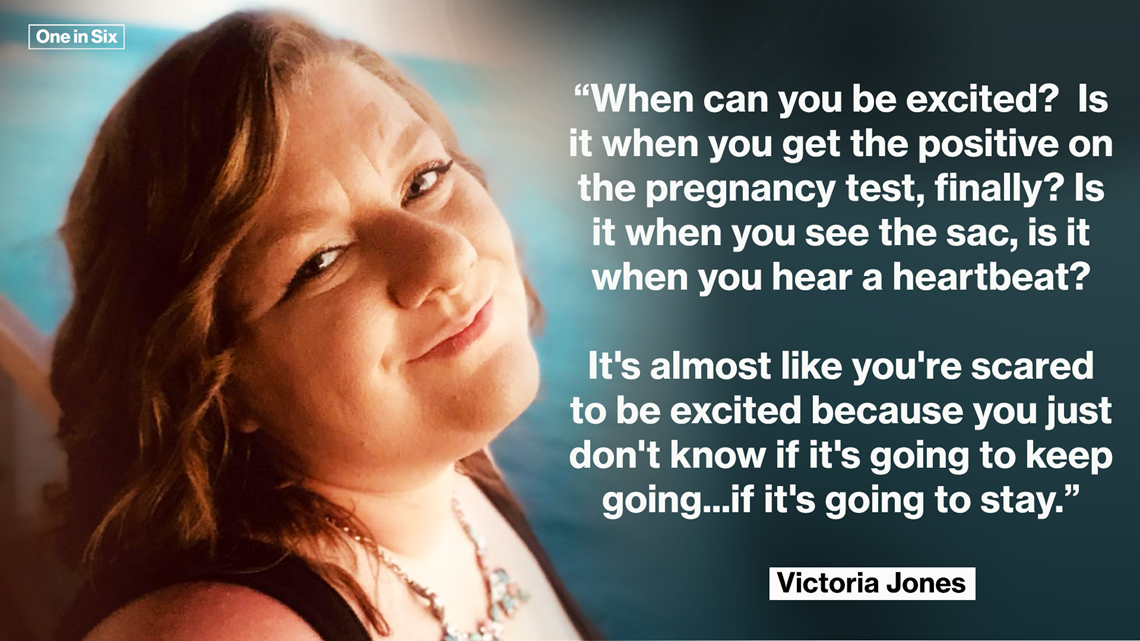
Moving Forward
The journey through infertility is one that demands persistent and radical hope against an onslaught of miscarriages, failed IVF rounds, and surgeries.
It is a struggle that often seems impossible to get through.
"When you're paying out, and running up credit cards, and remortgaging your homes and selling everything you can and not eating out and giving up everything you can...and still, there's no guarantee of it? Gosh, you just wonder if it's insurmountable," Edwards said.
It's also a disease that cannot be cured by adoption.
"I know a lot of people who don't go through it will say, well just adopt. But it is not that simple to ever give up seeing your face reflected in your child's face. Adoption is not a cure for the disease I had," Edwards said.
From the outside looking in, Kirsten Gonzalez understands how people not struggling with infertility could balk at her family's decision to sell their home.
"I think for folks saying this is elective surgery – I think you know, I didn’t ask for this. It’s not a decision I made. It’s just something I have to have in order to have a child. And I think that everybody should have that right financially. The financial pieces should not be the reason why people can’t pursue this option," Gonzalez said.
In many ways though for these advocates, the ultimate litmus test if their journey has been worth it or not does not lie in a positive pregnancy test or how many children they will have.
It is something much deeper.
Because in any number of homes in Tennessee, there is a couple silently wondering if the rounds of negative pregnancy tests they are seeing is normal.
There are women learning of her own infertility, watching as friend after co-worker after in-law announces a pregnancy. There are men wondering why their dream of one day becoming a father is so elusive.
Collectively, for Sonia Leonard and other advocates stepping up to a task none of them asked for, it is making the path through infertility easier for all those who will inevitably follow in their footsteps.
If they can make the path easier for just one family, their own journey is worth it.
"We all have a story. Everybody's story... it's tragic. It's trauma, There's good times, there's bad times. But what are we going to do with that story?" Leonard said. "That in itself, if nothing else happens, that is worth what we have gone through. That is why God has placed us and allowed things to happen to us, to bring other people up during their time of need."

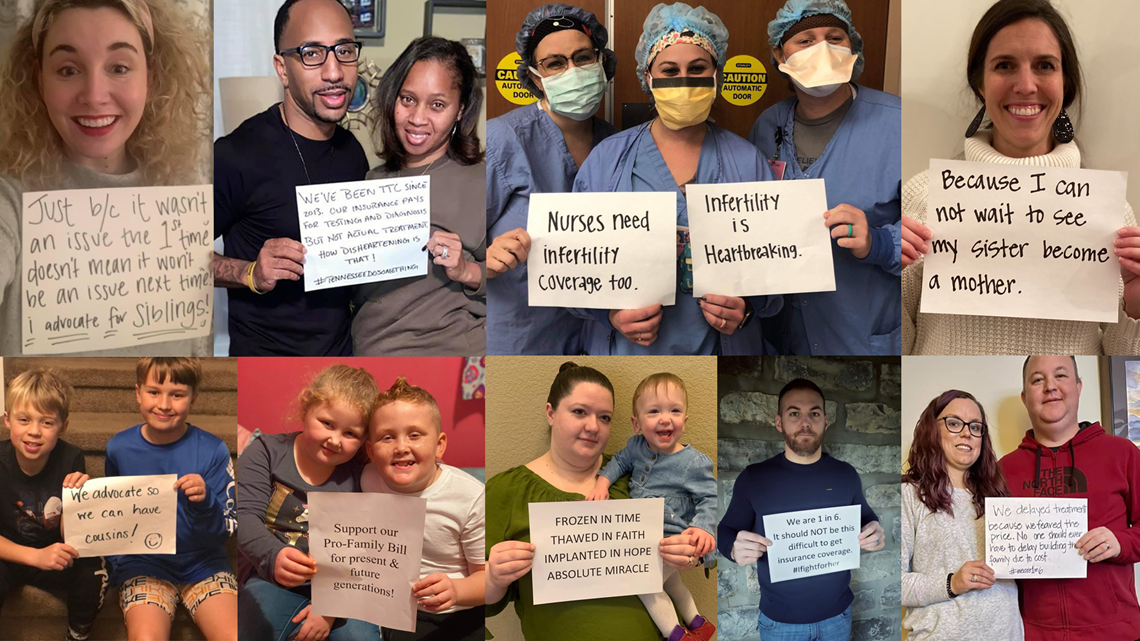
Resources and Ways to Get Involved
How do I get involved with Tennessee Fertility Advocates?: https://tnfertilityadvocates.com/
Which treatment would be best for me?: https://www.sartcorsonline.com/Predictor/Patient
What are the causes of infertility? : http://reproductivefacts.org/
What are the causes of female infertility: http://www.nashvillefertility.com/infertility-causes/causes-of-female-infertility/
What are the causes of male infertility: http://www.nashvillefertility.com/infertility-causes/causes-male-infertility/
National Embryo Donation Center: https://www.embryodonation.org/
Story by Madison Stacey. Beth Haynes contributed to this report.


